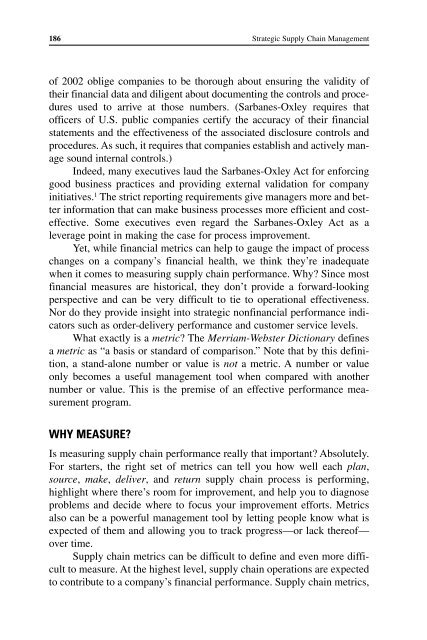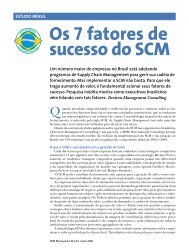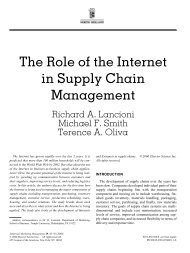- Page 2 and 3:
Want to learn more We hope you enjo
- Page 4 and 5:
Cohen and Roussel provide a valuabl
- Page 6 and 7:
Copyright © 2005 by The McGraw-Hil
- Page 8 and 9:
This page intentionally left blank.
- Page 10 and 11:
viii CONTENTS OWENS CORNING PROFILE
- Page 12 and 13:
x FOREWORD now it has to be brought
- Page 14 and 15:
xii FOREWORD Another “early adopt
- Page 16 and 17:
xiv FOREWORD through research, use,
- Page 18 and 19:
xvi FOREWORD on its promise. Is thi
- Page 20 and 21:
xviii ACKNOWLEDGMENTS owe thanks to
- Page 22 and 23:
This page intentionally left blank.
- Page 24 and 25:
2 Strategic Supply Chain Management
- Page 26 and 27:
4 Strategic Supply Chain Management
- Page 28 and 29:
6 Strategic Supply Chain Management
- Page 30 and 31:
This page intentionally left blank.
- Page 32 and 33:
10 Strategic Supply Chain Managemen
- Page 34 and 35:
12 Strategic Supply Chain Managemen
- Page 36 and 37:
14 Strategic Supply Chain Managemen
- Page 38 and 39:
16 Strategic Supply Chain Managemen
- Page 40 and 41:
18 Strategic Supply Chain Managemen
- Page 42 and 43:
20 Strategic Supply Chain Managemen
- Page 44 and 45:
22 Strategic Supply Chain Managemen
- Page 46 and 47:
24 Strategic Supply Chain Managemen
- Page 48 and 49:
26 Strategic Supply Chain Managemen
- Page 50 and 51:
28 Strategic Supply Chain Managemen
- Page 52 and 53:
30 Strategic Supply Chain Managemen
- Page 54 and 55:
32 Strategic Supply Chain Managemen
- Page 56 and 57:
34 Strategic Supply Chain Managemen
- Page 58 and 59:
36 Strategic Supply Chain Managemen
- Page 60 and 61:
This page intentionally left blank.
- Page 62 and 63:
40 Strategic Supply Chain Managemen
- Page 64 and 65:
42 Strategic Supply Chain Managemen
- Page 66 and 67:
44 Strategic Supply Chain Managemen
- Page 68 and 69:
46 Strategic Supply Chain Managemen
- Page 70 and 71:
48 Strategic Supply Chain Managemen
- Page 72 and 73:
50 Strategic Supply Chain Managemen
- Page 74 and 75:
52 Strategic Supply Chain Managemen
- Page 76 and 77:
54 Strategic Supply Chain Managemen
- Page 78 and 79:
56 Strategic Supply Chain Managemen
- Page 80 and 81:
58 Strategic Supply Chain Managemen
- Page 82 and 83:
60 Strategic Supply Chain Managemen
- Page 84 and 85:
62 Strategic Supply Chain Managemen
- Page 86 and 87:
64 Strategic Supply Chain Managemen
- Page 88 and 89:
66 Strategic Supply Chain Managemen
- Page 90 and 91:
68 Strategic Supply Chain Managemen
- Page 92 and 93:
70 Strategic Supply Chain Managemen
- Page 94 and 95:
72 Strategic Supply Chain Managemen
- Page 96 and 97:
74 Strategic Supply Chain Managemen
- Page 98 and 99:
76 Strategic Supply Chain Managemen
- Page 100 and 101:
78 Strategic Supply Chain Managemen
- Page 102 and 103:
80 Strategic Supply Chain Managemen
- Page 104 and 105:
82 Strategic Supply Chain Managemen
- Page 106 and 107:
84 Strategic Supply Chain Managemen
- Page 108 and 109:
86 Strategic Supply Chain Managemen
- Page 110 and 111:
88 Strategic Supply Chain Managemen
- Page 112 and 113:
90 Strategic Supply Chain Managemen
- Page 114 and 115:
92 Strategic Supply Chain Managemen
- Page 116 and 117:
94 Strategic Supply Chain Managemen
- Page 118 and 119:
96 Strategic Supply Chain Managemen
- Page 120 and 121:
98 Strategic Supply Chain Managemen
- Page 122 and 123:
100 Strategic Supply Chain Manageme
- Page 124 and 125:
102 Strategic Supply Chain Manageme
- Page 126 and 127:
104 Strategic Supply Chain Manageme
- Page 128 and 129:
106 Strategic Supply Chain Manageme
- Page 130 and 131:
108 Strategic Supply Chain Manageme
- Page 132 and 133:
110 Strategic Supply Chain Manageme
- Page 134 and 135:
112 Strategic Supply Chain Manageme
- Page 136 and 137:
114 Strategic Supply Chain Manageme
- Page 138 and 139:
116 Strategic Supply Chain Manageme
- Page 140 and 141:
118 Strategic Supply Chain Manageme
- Page 142 and 143:
120 Strategic Supply Chain Manageme
- Page 144 and 145:
122 Strategic Supply Chain Manageme
- Page 146 and 147:
124 Strategic Supply Chain Manageme
- Page 148 and 149:
126 Strategic Supply Chain Manageme
- Page 150 and 151:
128 Strategic Supply Chain Manageme
- Page 152 and 153:
This page intentionally left blank.
- Page 154 and 155:
132 Strategic Supply Chain Manageme
- Page 156 and 157:
134 Strategic Supply Chain Manageme
- Page 158 and 159: 136 Strategic Supply Chain Manageme
- Page 160 and 161: 138 Strategic Supply Chain Manageme
- Page 162 and 163: 140 Strategic Supply Chain Manageme
- Page 164 and 165: 142 Strategic Supply Chain Manageme
- Page 166 and 167: 144 Strategic Supply Chain Manageme
- Page 168 and 169: 146 Strategic Supply Chain Manageme
- Page 170 and 171: 148 Strategic Supply Chain Manageme
- Page 172 and 173: 150 Strategic Supply Chain Manageme
- Page 174 and 175: 152 Strategic Supply Chain Manageme
- Page 176 and 177: 154 Strategic Supply Chain Manageme
- Page 178 and 179: 156 Strategic Supply Chain Manageme
- Page 180 and 181: 158 Strategic Supply Chain Manageme
- Page 182 and 183: 160 Strategic Supply Chain Manageme
- Page 184 and 185: 162 Strategic Supply Chain Manageme
- Page 186 and 187: 164 Strategic Supply Chain Manageme
- Page 188 and 189: 166 Strategic Supply Chain Manageme
- Page 190 and 191: This page intentionally left blank.
- Page 192 and 193: 170 Strategic Supply Chain Manageme
- Page 194 and 195: 172 Strategic Supply Chain Manageme
- Page 196 and 197: 174 Strategic Supply Chain Manageme
- Page 198 and 199: 176 Strategic Supply Chain Manageme
- Page 200 and 201: 178 Strategic Supply Chain Manageme
- Page 202 and 203: 180 Strategic Supply Chain Manageme
- Page 204 and 205: 182 Strategic Supply Chain Manageme
- Page 206 and 207: 184 Strategic Supply Chain Manageme
- Page 210 and 211: 188 Strategic Supply Chain Manageme
- Page 212 and 213: 190 Strategic Supply Chain Manageme
- Page 214 and 215: 192 Strategic Supply Chain Manageme
- Page 216 and 217: 194 Strategic Supply Chain Manageme
- Page 218 and 219: 196 Strategic Supply Chain Manageme
- Page 220 and 221: 198 Strategic Supply Chain Manageme
- Page 222 and 223: 200 Strategic Supply Chain Manageme
- Page 224 and 225: 202 Strategic Supply Chain Manageme
- Page 226 and 227: 204 Strategic Supply Chain Manageme
- Page 228 and 229: 206 Strategic Supply Chain Manageme
- Page 230 and 231: 208 Strategic Supply Chain Manageme
- Page 232 and 233: 210 Strategic Supply Chain Manageme
- Page 234 and 235: 212 Strategic Supply Chain Manageme
- Page 236 and 237: 214 Strategic Supply Chain Manageme
- Page 238 and 239: 216 Strategic Supply Chain Manageme
- Page 240 and 241: 218 Strategic Supply Chain Manageme
- Page 242 and 243: 220 Strategic Supply Chain Manageme
- Page 244 and 245: 222 Strategic Supply Chain Manageme
- Page 246 and 247: 224 Strategic Supply Chain Manageme
- Page 248 and 249: 226 Strategic Supply Chain Manageme
- Page 250 and 251: This page intentionally left blank.
- Page 252 and 253: 230 Strategic Supply Chain Manageme
- Page 254 and 255: 232 Strategic Supply Chain Manageme
- Page 256 and 257: 234 Strategic Supply Chain Manageme
- Page 258 and 259:
236 Strategic Supply Chain Manageme
- Page 260 and 261:
238 Strategic Supply Chain Manageme
- Page 262 and 263:
240 Strategic Supply Chain Manageme
- Page 264 and 265:
242 Strategic Supply Chain Manageme
- Page 266 and 267:
244 Strategic Supply Chain Manageme
- Page 268 and 269:
246 Strategic Supply Chain Manageme
- Page 270 and 271:
This page intentionally left blank.
- Page 272 and 273:
250 Strategic Supply Chain Manageme
- Page 274 and 275:
252 Strategic Supply Chain Manageme
- Page 276 and 277:
254 Strategic Supply Chain Manageme
- Page 278 and 279:
256 Strategic Supply Chain Manageme
- Page 280 and 281:
This page intentionally left blank.
- Page 282 and 283:
260 Strategic Supply Chain Manageme
- Page 284 and 285:
262 Strategic Supply Chain Manageme
- Page 286 and 287:
264 Strategic Supply Chain Manageme
- Page 288 and 289:
266 Strategic Supply Chain Manageme
- Page 290 and 291:
268 Strategic Supply Chain Manageme
- Page 292 and 293:
270 Strategic Supply Chain Manageme
- Page 294 and 295:
This page intentionally left blank.
- Page 296 and 297:
274 Strategic Supply Chain Manageme
- Page 298 and 299:
Stage 4: Cross-Enterprise Collabora
- Page 300 and 301:
FIGURE B-3 Summary results of popul
- Page 302 and 303:
280 Strategic Supply Chain Manageme
- Page 304 and 305:
282 Strategic Supply Chain Manageme
- Page 306 and 307:
284 Strategic Supply Chain Manageme
- Page 308 and 309:
286 Strategic Supply Chain Manageme
- Page 310 and 311:
288 Strategic Supply Chain Manageme
- Page 312 and 313:
290 Strategic Supply Chain Manageme
- Page 314 and 315:
292 Strategic Supply Chain Manageme
- Page 316 and 317:
294 Strategic Supply Chain Manageme
- Page 318 and 319:
296 Strategic Supply Chain Manageme
- Page 320 and 321:
298 Strategic Supply Chain Manageme
- Page 322 and 323:
300 Strategic Supply Chain Manageme
- Page 324 and 325:
302 Strategic Supply Chain Manageme
- Page 326 and 327:
304 Strategic Supply Chain Manageme
- Page 328 and 329:
This page intentionally left blank.
- Page 330 and 331:
308 Index Business strategy: metric
- Page 332 and 333:
310 Index F Faught, Laura, 175-176
- Page 334 and 335:
312 Index Mexico, 96, 196 Michelin,
- Page 336 and 337:
314 Index Regional planning group,
- Page 338:
316 Index Toys “R” Us, 53 Trace






